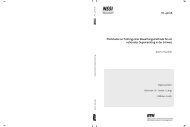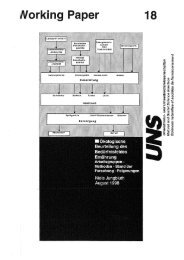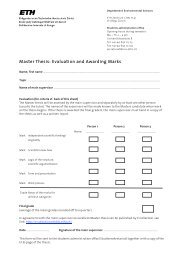The Paradigm of Human-Environment Systems - Natural and Social ...
The Paradigm of Human-Environment Systems - Natural and Social ...
The Paradigm of Human-Environment Systems - Natural and Social ...
You also want an ePaper? Increase the reach of your titles
YUMPU automatically turns print PDFs into web optimized ePapers that Google loves.
Rol<strong>and</strong> W. Scholz & Claudia Binder<br />
Table 2: Brief definition, examples, <strong>and</strong> some regulatory mechanisms that are essential in shaping<br />
the human-environment interaction.<br />
Hierarchy<br />
level<br />
Definition Example Regulatory Mechanism (examples only)<br />
Cell Smallest self-functioning unit comEukary- • Change <strong>of</strong> proportion <strong>of</strong> volume <strong>and</strong> number<br />
posed <strong>of</strong>:<br />
ontic <strong>of</strong> cell nuclei to cell organelles (primary feedb-<br />
(a) a boundary (b) a reproduction unit, Prokaryack loop)<br />
(c) a power plant, (d) a production ontic cells • Mutation (secondary feedback loop)<br />
unit, <strong>and</strong> (d) a clean up mechanism to<br />
adapt to the environment (Miller,<br />
1978)<br />
• Classical conditioning (learning, Brembs. et al.,<br />
2002)<br />
Organ Part <strong>of</strong> the body with special func- Heart, • Regeneration by building new tissue (self regutions,<br />
which depends on other parts lung, liver, lation)<br />
<strong>of</strong> the body for functioning. <strong>The</strong> functions<br />
all covered by each cell are divided<br />
into different organs Riede et al.<br />
1989)<br />
kidney • Adaptation by changing the number <strong>of</strong> cells<br />
depending on stress (primary feedback loop)<br />
• Loss <strong>of</strong> function when over dem<strong>and</strong>ed (primary<br />
or secondary feedback loop; secondary in<br />
case <strong>of</strong> chronic dem<strong>and</strong>s)<br />
Individual A single person with a specific life Pupil, • Consistency, equity, <strong>and</strong> balance as ubiquitous<br />
history, stage <strong>of</strong> development <strong>and</strong> adult principles (in strategy selection <strong>and</strong> post deci-<br />
experiences. <strong>The</strong> individual is govsional<br />
evaluation, Festinger 1957))<br />
erned by driving forces such as<br />
• Positive attractors (imitation, learning through<br />
(i) drives (Freud, 1920; Lorenz 1963)<br />
models, B<strong>and</strong>ura, 1971; e.g. in goal formation<br />
(ii) needs (Maslow, 1954; Douglas et al.<br />
1998)<br />
(iii) emotions (Izard, 1977; Keltner &<br />
Ekmann, 2000)<br />
(iv) motivations (Weiner, 1990; 2000)<br />
(v) attitudes (Fishbein & Ajzen, 1975)<br />
(vi) values (Rockeach, 1973; Schwartz<br />
1992)<br />
(vii) cognitions (Neisser, 1976)<br />
<strong>and</strong> strategy selection)<br />
Group Defined amount <strong>of</strong> people, who in- Play group • Group norms (Ash, 1956); Conformity (Sherif,<br />
teract <strong>and</strong> form a unity in a defined<br />
period <strong>of</strong> time for a defined task <strong>and</strong><br />
in a certain place. <strong>The</strong>re is no formal<br />
requirement to enter a group. Open,<br />
closed, psychological, sociological <strong>and</strong><br />
other groups can be differentiated<br />
Skaters,<br />
environmentalists<br />
1935; goal formation <strong>and</strong> strategy selection)<br />
• Dominant person/authority pressure (Milgram,<br />
1974; strategy selection, primary feedback<br />
loop)<br />
• Decision schemes (e.g., absolute or relative<br />
majority, Davis, 1973, strategy selection)<br />
Organiza- <strong>Social</strong> systems or economic subunits, Firms,<br />
tion which produce goods or motivate <strong>and</strong> World<br />
coordinate people to certain actions. Wildlife<br />
Membership is necessary.<br />
Fund<br />
(will be continued on next page)<br />
10 April 2003

















